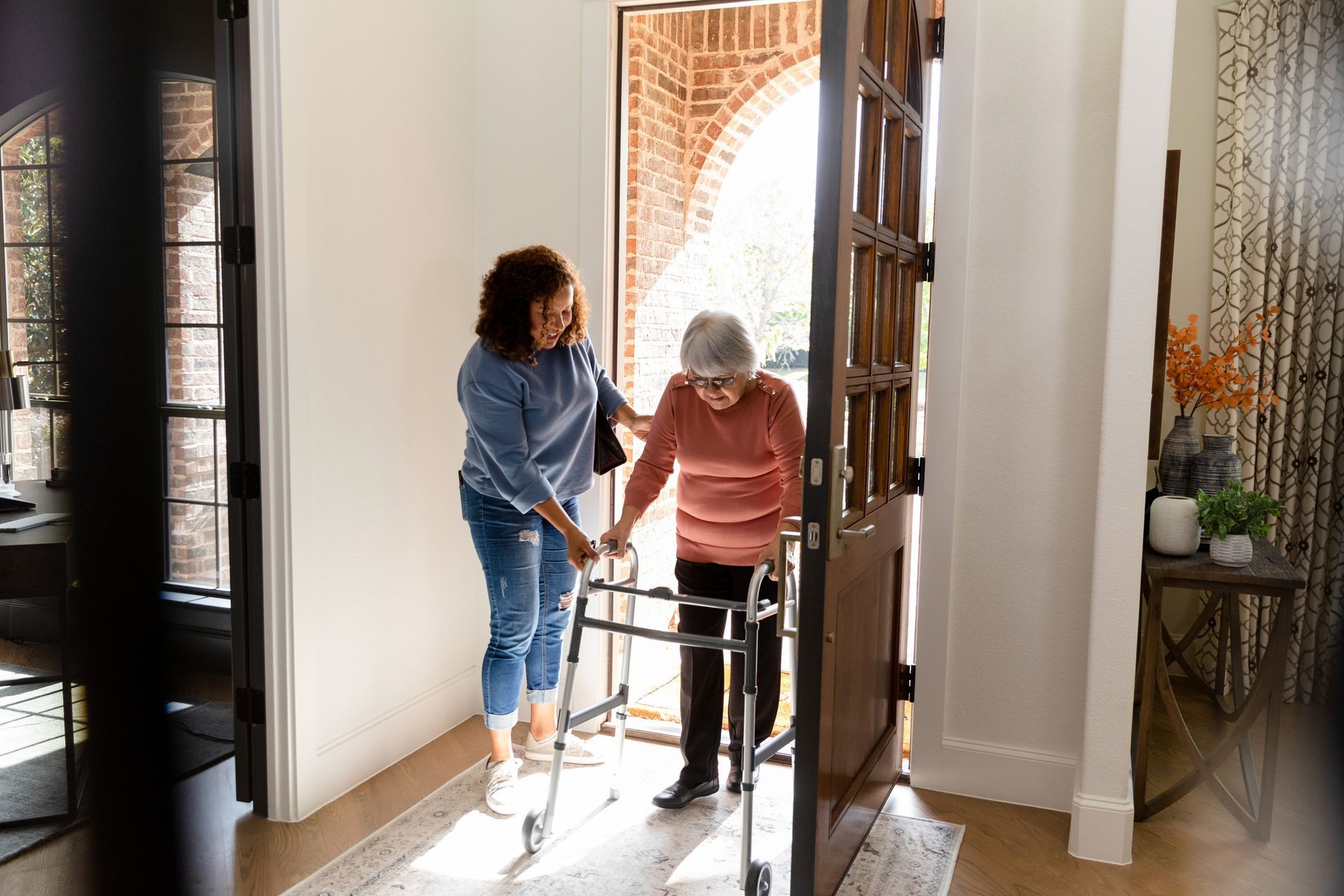Home Health Care Aide: Your Complete Guide to In-Home Care Services in New Hampshire
As New Hampshire's population continues to age, more families are discovering the transformative benefits of home health care aide services that enable their loved ones to maintain independence and dignity in their own homes. With over 77% of long-term care now delivered in home-based settings rather than nursing facilities, the role of compassionate home health aides has never been more critical.
Whether you're exploring care options for an aging family member in Coös County or considering a rewarding career in health care, understanding the comprehensive scope of home health aide services can help you make informed decisions. This guide covers everything from daily responsibilities and training requirements to finding quality care providers in New Hampshire.

What is a Home Health Care Aide?
A home health care aide is a trained healthcare professional who provides essential personal care and support services to individuals in their own homes. These dedicated caregivers primarily serve elderly adults, people with disabilities, those recovering from illness or surgery, and individuals managing chronic health conditions who need assistance with activities of daily living.
Difference Between Home Health Aides, Personal Care Aides, and CNAs
Understanding the distinctions between different types of care providers helps families choose the right level of support. Home Health Aides work under the supervision of registered nurses or physical therapists and can perform basic health monitoring tasks like checking vital signs, documenting changes in client condition, and assisting with prescribed exercises. They complete formal training programs and must pass competency evaluations.
Personal Care Aides focus primarily on non-medical assistance with daily living activities and companionship. They typically require less formal training and cannot perform health-related tasks. Certified Nursing Assistants (CNAs) primarily work in medical facilities like nursing homes and hospitals, providing basic medical care under nurse supervision. While CNAs can work in home settings, their training emphasizes institutional care.
How Home Health Aides Support Aging in Place and Independence
Home health aides serve as the cornerstone of successful aging in place by bridging the gap between complete independence and institutional care. They enable clients to maintain their familiar routines, preserve important relationships with neighbors and community, and retain control over their daily schedules while receiving necessary support.
In Coös County, New Hampshire, many home health aides work with clients in rural areas where access to medical facilities may be limited, making their role even more vital for maintaining health and safety in the community.
Essential Duties and Responsibilities of Home Health Care Aides
The scope of home health aide services encompasses both personal care assistance and light health monitoring, always performed under the supervision of licensed health care professionals.
Personal Care Assistance
Home health aides provide hands-on assistance with fundamental activities of daily living that clients may struggle to perform independently. This includes bathing and hygiene support, helping with showers, bed baths, oral care, and grooming. They provide dressing assistance, supporting clients in selecting appropriate clothing and getting dressed. Toileting and incontinence care is provided with dignity-preserving bathroom assistance.
Mobility and transfer support helps clients move safely between bed, chair, and wheelchair. Skin care and positioning prevents pressure sores through regular repositioning.
Health Monitoring and Vital Signs Tracking
While home health aides cannot provide skilled nursing care, they play a crucial role in monitoring client health status. This includes taking and recording blood pressure, temperature, pulse, and weight, as well as observing and documenting changes in client condition or behavior. They report concerns to the supervisor or case manager, monitor for signs of infection, pain, or distress, and track medication compliance and side effects.

Medication Reminders and Administration Support
Home health aides help ensure medication safety through providing verbal reminders for scheduled medications, organizing pill boxes and medication schedules, and observing clients taking medications in states where permitted. They document medication compliance in medical records and report missed doses or adverse reactions to health care professionals. Note that the ability to administer medication varies by state certification and agency policies.
Light Housekeeping and Meal Preparation
Many home health aides assist with household tasks essential for health and safety, including light cleaning and changing bed linens, grocery shopping and meal preparation, and laundry and basic household organization. They serve meals and ensure proper nutrition while maintaining a safe, clean living environment.
Companionship and Emotional Support
The emotional well-being component of home health aide services often proves just as valuable as physical care. In-home care services provide social interaction and conversation, supporting mental health through engagement activities. Aides offer reassurance during anxiety or confusion, facilitate communication with family members, and encourage participation in hobbies and interests.
Transportation to Medical Appointments
Home health aides frequently accompany patients to routine medical appointments with doctors offices, physical therapy and occupational therapy sessions, specialist consultations and diagnostic tests, pharmacy visits for prescription pickups, and social services appointments.
Who Benefits from Home Health Care Aide Services
Home health aide services provide crucial support for diverse populations facing various health challenges and life transitions.
Seniors Aging in Place Who Need Daily Living Assistance
The majority of home health aide clients are older adults who prefer to remain in their own homes rather than move to assisted living facilities or nursing homes. These individuals may experience difficulty with bathing, dressing, or personal hygiene, mobility limitations affecting safety, mild cognitive changes requiring gentle guidance, chronic health conditions requiring monitoring, and social isolation and loneliness.
Adults with Disabilities Requiring Personal Care Support
Home health aides work with people of all ages who have physical, intellectual, or developmental disabilities. They provide essential support that enables these individuals to live independently in their communities while maintaining dignity and choice in their daily routines.
Patients Recovering from Surgery or Illness
Following hospital discharge, many patients benefit from temporary home health aide services during recovery periods. This support helps prevent readmissions and complications while clients regain strength and independence.
Individuals with Chronic Conditions
People managing chronic illnesses like diabetes, heart disease, or chronic obstructive pulmonary disease often require ongoing support with monitoring symptoms and vital signs, medication management and reminders, diet and exercise compliance, recognition of emergency situations, and transportation to frequent medical appointments.
Family Caregivers Needing Respite Care Support
Home health aide services provide essential relief for family members who serve as primary caregivers, allowing them to maintain employment and financial stability, attend to their own health needs, preserve relationships and avoid caregiver burnout, and take breaks for rest and personal time.
Required Skills and Qualifications for Home Health Care Aides
Success as a home health aide requires a unique combination of personal qualities, technical skills, and formal qualifications that enable effective care delivery in diverse home environments.

Essential Personal Qualities
Compassion and empathy for client needs is fundamental. Compassionate home health aides understand that clients may be experiencing fear, frustration, or grief related to their health changes. The ability to provide emotional support while maintaining professional boundaries is essential for building trust and therapeutic relationships.
Patience when working with confused or anxious clients is critical. Many home health aides work with clients experiencing cognitive changes, mental health challenges, or anxiety about their care needs. Patience allows aides to provide gentle guidance and support without rushing or becoming frustrated with repetitive questions or behaviors.
Physical stamina for demanding daily tasks is required. The job duties of home health aides are physically demanding, requiring ability to lift and transfer clients safely, stamina for long shifts spent on feet, manual dexterity for personal care tasks, physical strength for housekeeping duties, and endurance for accompanying clients on outings.
Strong communication and interpersonal skills enable effective home health aides to communicate clearly with clients who may have hearing, vision, or cognitive impairments, family members with varying levels of medical knowledge, health care professionals using appropriate medical terminology, and supervisors and case managers for care plan updates.
Reliability and punctuality for consistent care is crucial. Clients depend on home health aides for essential daily support, making reliability crucial. Consistent attendance and punctuality help maintain client safety and build trust with families who are entrusting their loved ones' care to the aide.
Technical Skills and Knowledge
Basic medical knowledge and first aid is essential. Home health aides must understand normal ranges for vital signs and when to report changes, basic infection control procedures and universal precautions, recognition of emergency situations requiring immediate medical attention, proper body mechanics for safe client transfers, and basic first aid and CPR techniques.
Understanding of vital signs monitoring requires knowledge of proper technique for taking blood pressure, pulse, temperature, and respirations, normal ranges for different age groups and health conditions, documentation requirements for medical records, and when to report abnormal findings to supervising health care professionals.
Home health aides must maintain strict infection control practices to protect both clients and themselves, including hand hygiene techniques and appropriate use of personal protective equipment, safe handling and disposal of contaminated materials, recognition of signs and symptoms of infectious diseases, and isolation precautions when working with clients with contagious conditions.
Time management and organizational abilities enable successful home health aides to efficiently manage multiple responsibilities, including prioritizing urgent care needs while maintaining routine schedules, organizing supplies and equipment for efficient care delivery, coordinating with other members of the care team, and maintaining accurate documentation and communication.
Problem-solving and adaptability skills are vital. The home environment presents unique challenges requiring critical thinking to assess and respond to changing client needs, creativity in adapting care techniques to available resources, flexibility in adjusting schedules and approaches based on client preferences, and quick decision-making in emergency or unexpected situations.
Education and Training Requirements in New Hampshire

New Hampshire maintains specific standards for home health aide education and certification to ensure quality care and client safety. Most employers and training programs require candidates to have a high school diploma or GED equivalent. This educational foundation provides the basic reading, writing, and math skills necessary for understanding medical terminology and care instructions, accurately documenting client information in medical records, calculating measurements for medication reminders and diet tracking, and communicating effectively with health care professionals and families.
New Hampshire follows federal guidelines requiring home health aides to complete at least 75 hours of formal training before working independently with clients. This training program includes classroom instruction and supervised practical experience covering all essential aspects of patient care and safety.
Upon completing the training program, candidates must pass both written and practical competency evaluations. Certified home health aides must participate in ongoing education to maintain their certification and stay current with best practices. All candidates must also undergo comprehensive background screening including criminal background checks at state and federal levels.
How to Become a Certified Home Health Care Aide
The pathway to becoming a certified home health aide in New Hampshire typically takes six to twelve weeks from training start to employment, depending on program format and individual pace. The process involves meeting basic requirements, enrolling in an approved training program, completing required training hours, passing certification examinations, and applying for employment.
Training programs are available through community colleges, vocational schools, and private care agencies. Each offers unique benefits including flexible scheduling, financial aid opportunities, career placement assistance, and specialized equipment and simulation labs.
Training costs typically range from $800 to $2,500 depending on program type and location. Financial assistance may be available through workforce development grants, employer sponsorship programs, veterans benefits, scholarship programs, and payment plans offered by training institutions.
Work Environment and Daily Life

Understanding the realities of working as a home health aide helps prospective caregivers prepare for both the rewards and challenges of this meaningful profession. Home health aides work in various environments including private homes, assisted living facilities, and group homes. Each setting presents unique opportunities and considerations.
The profession offers various scheduling options including full-time positions, part-time options, and live-in care arrangements to accommodate different lifestyle needs. Home health aide work involves significant physical demands that require proper preparation and self-care, along with strict safety protocols to protect both caregivers and clients.
Successful home health aides develop collaborative relationships with client families and healthcare professionals. The work provides unique emotional rewards including making a meaningful difference in clients' quality of life and developing deep, trusting relationships. Challenges include emotional attachment to clients who may experience decline and balancing professional objectivity with personal compassion.
Salary and Career Outlook for Home Health Care Aides
The demand for qualified home health aides continues to grow dramatically as demographic trends drive increased need for in-home care services across New Hampshire and the nation. Home health aide compensation varies based on several factors, with New Hampshire rates generally competitive with national averages.
National statistics show a median annual wage of $34,900 according to the Bureau of Labor Statistics in 2024. New Hampshire specific data indicates average annual salary of $36,200 to $42,000, with entry-level positions at $14 to $17 per hour and experienced caregivers earning $18 to $24 per hour.
For more information about in-home care services, visit Androscoggin Valley Home Care Services. Learn more about professional homecare services in your area to support your loved ones.
The job growth outlook for home health aides is exceptionally strong with projected growth rate of 17% between 2024 and 2034, much faster than average for all occupations. Home health aide experience provides foundation for multiple healthcare career pathways including advancement to senior positions, educational pathways to nursing, and entrepreneurial opportunities.
Finding the Right Home Health Care Aide for Your Family
Selecting the appropriate home health aide requires careful consideration of your loved one's specific needs, family preferences, and available resources. Working with licensed home care agencies provides numerous advantages including professional screening and vetting, training and supervision, insurance and liability protection, backup coverage and continuity, and comprehensive care plan management.
When evaluating potential care providers, families should watch for red flags including inadequate documentation, communication problems, and unprofessional behavior. Important questions to ask cover experience and training, care approach and philosophy, and practical considerations. Checking references and certifications is essential, and most reputable agencies offer trial periods allowing families to evaluate compatibility before committing to long-term arrangements.
Payment Options and Insurance Coverage
Understanding the various funding sources for home health aide services helps families plan financially for long-term care needs. Medicare provides limited coverage for home health aide services under specific circumstances, requiring physician orders and meeting strict homebound criteria.
New Hampshire offers several Medicaid waiver programs expanding coverage for home and community-based services including the Choices for Independence Program, Acquired Brain Disorder Waiver, and Developmental Services Waiver. Many private long-term care policies cover home health aide services, and Health Savings Account funds can be used for qualified expenses.
Eligible veterans may qualify for home health aide services through Aid and Attendance pension benefits and other VA programs. Many communities also offer charitable assistance programs for home care services through Area Agencies on Aging, faith-based organizations, and community foundations.

Why Choose Androscoggin Valley Home Care Services
With over 50 years of dedicated service to Coös County families since 1975, Androscoggin Valley Home Care Services has established itself as the premier provider of comprehensive home health aide services in northern New Hampshire. This extensive experience translates into a proven track record of successful care outcomes, deep community reputation, and understanding of rural healthcare challenges.
As a licensed nonprofit organization, Androscoggin Valley Home Care Services operates with a mission-driven approach prioritizing client welfare. The organization maintains full state licensing, national accreditation, and employs a rigorous hiring process with extensive training programs exceeding state minimum requirements.
Androscoggin Valley Home Care Services provides a full spectrum of home health services including professional nursing services, personal care services, homemaker services, and respite care support. Understanding that every client has unique needs, they develop individualized care approaches with comprehensive assessment processes and flexible service options.
Recognizing that financial constraints should not prevent access to quality care, the organization operates Dorothy's Gift, a charitable assistance program providing sliding fee scales, emergency assistance, and resource connections linking families with additional support programs.
As a community-based organization, Androscoggin Valley Home Care Services understands and respects the unique cultural characteristics of northern New Hampshire. They provide round-the-clock support with 24-hour phone support for clients and families, on-call nursing staff, emergency backup aide coverage, and coordination with local emergency services.
For families in Coös County seeking reliable, compassionate home health aide services, Androscoggin Valley Home Care Services offers the experience, expertise, and community commitment necessary to support successful aging in place. Their comprehensive approach addresses not only the physical care needs of clients but also the emotional and practical concerns of families navigating the complexities of long-term care planning.
The combination of professional healthcare expertise, local community understanding, and flexible service options makes Androscoggin Valley Home Care Services an ideal partner for families seeking to maintain their loved one's independence, dignity, and quality of life in the comfort of home. Whether you need temporary support during recovery from surgery, ongoing assistance with chronic health conditions, or comprehensive care for aging family members, their team of certified home health aides stands ready to provide the skilled, compassionate care that enables people to thrive in their own homes.










